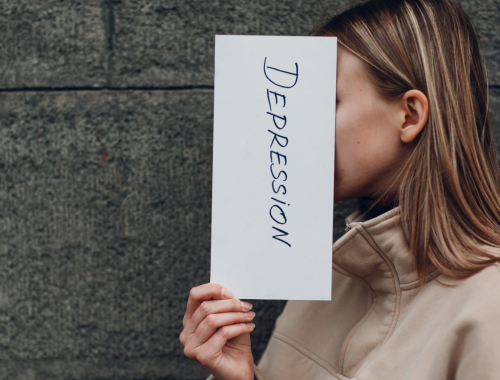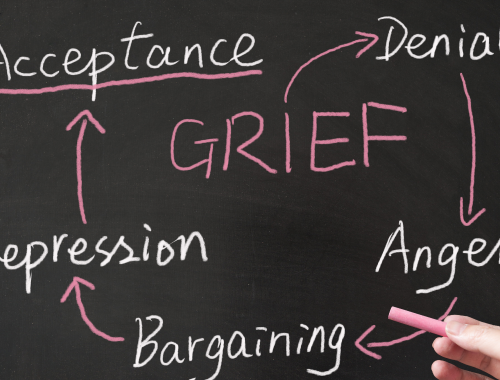Difference Between Depression and Grief

A natural reaction to any loss is grief, which includes denial, shock, anger, cognitive and emotional suffering, and spiritual reactions. A medical condition that involves mental illness in which mood is persistently low and there is no zeal to do anything or get involved in any activity is called depression or bipolar disorder.

Similarity
- Weight loss
- Loss of appetite
- Intense malaise
Depression
Depression is a mood disorder (marked disruptions in emotions)characterized by persistent sorrow and loss of interest. Clinical depression, commonly referred to as major depressive illness, has an impact on your emotions, thoughts, and actions. Your typical daily duties could be challenging for you, and you might occasionally feel that life isn’t worth living.
Grief
Grief is an emotional response to loss, particularly when that loss involves a person or other living thing with whom you had a strong bond or fondness. In addition to its typical focus on the emotional response to loss, grief also involves a variety of other components, such as those that are cognitive feelings, behavioral emotions, social response, cultural response, spiritual, and philosophical sufferings.
Difference between Depression and Grief
Definition
Depression – Depression is a psychological condition marked by poor mood and reluctance to exertion.
Grief – intense emotional response to a loss of loved one or something which is too dear.
Symptoms
Depression
- Feeling of worthlessness
- Hopelessness
- Helplessness
- Suicidal ideation
- Somatic distress
- Sleep and appetite disturbances
- Decreased concentration
- Social withdrawal
Grief
- Somatic distress
- Sleep and appetite disturbances
- Decreased concentration
- Sighing
- Social withdrawal
Emotions
Depression
Fixed emotions and feelings of being stuck.
Grief
It is a natural reaction or response to feeling of losing a loved one.
Prevalence
Depression
- Not normal
- Prevalence of major depression – 1% to 53%
- Increased prevalence (77%) with advanced disease
- Pain – a major risk factor and is exacerbated by depression
Grief
Normal, expected
Associated with disease progression
Summary
The points of difference between Depression and Griefhave been summarized as below:

FAQ:
What is the difference between grief and bereavement?
Bereavement is the emotional state that results from losing a loved one. Grief is one’s emotional and sorrowful reaction to a loss of a loved one.
Is depression the same thing as being really sad like after someone dies?
After someone passes away, despair and hopelessness are extremely frequent. In daily life, these emotions are sometimes referred to as “depression.”
Is grief stronger than sadness?
Yes, grief is a stronger emotion than sadness. Sadness is a defining sign of grief, which is the result of losing something important to us. An ordinary human emotion is sadness. We all routinely experience it, perhaps some more profoundly than others, but it appears differently for various individuals and in different settings. You may say that melancholy and love are inseparably intertwined in this way. Yes, it is normal to feel depressed during a time of loss.
Is depression and sorrow the same thing?
A crucial clinical distinction between sorrow caused due to loss-related grief and depression is that sorrow is an emotion of deep distress, disappointment, or grief and clinical depression is usually accompanied by very low self-esteem, regardless of whether it is caused by a loss.
What is permanent sadness called?
A person who experiences persistently and kind of permanent low moods is said to have persistent depressive disorder (PDD) or permanent sadness, a chronic (ongoing) form of depression. Dysthymia or persistent depressive condition is also called permanent sadness.
What is depression actually called?
Depression is also termed as mood disorder. It is a prolonged sense of anxiety, gloominess and loss of interest in daily life activities.
What is dysfunctional grieving?
Dysfunctional mourning/grieving refers to a breakdown in the expected progression of normal grief towards resolution. When a procedure deviates from the norm, the person becomes overburdened and turns to unhealthy coping strategies.
How long does it take to stop grieving?
The grieving process frequently lasts for 1 year or longer. The emotional sufferings and sadness and changes in daily life brought on by the loss of a loved one must be dealt with by the mourning person. Though the anger, denial, sadness and the pain may lessen over time, it’s common to continue to feel emotionally connected to the deceased for a long time.
How does grief affect the brain?
There are numerous ways in which grief and loss impact the brain and body. They can affect the immune system as well as the heart and can alter memory, behavior, sleep, and bodily functions. Additionally, it may cause cognitive consequences like brain fog.
- Difference Between Global Warming and Greenhouse Effect - May 18, 2024
- Difference Between Vaccination and Immunization - March 3, 2024
- Difference Between Selective Mutism and Autism - February 25, 2024
Search DifferenceBetween.net :
Leave a Response
References :
[0]Chentsova-Dutton, Y., Shucter, S., Hutchin, S., Strause, L., Burns, K., Dunn, L., ... & Zisook, S. (2002). Depression and grief reactions in hospice caregivers: From pre-death to 1 year afterwards. Journal of affective disorders, 69(1-3), 53-60.
[1]Friedman, R. A. (2012). Grief, depression, and the DSM-5. The New England Journal of Medicine.
[2]Moore, M., & Carr, A. (2000). Depression and grief. What works with children and adolescents? A critical review of psychological interventions with children, adolescents and their families, 203-232.
[3]Walker, R. J., & Pomeroy, E. C. (1996). Depression or grief? The experience of caregivers of people with dementia. Health & Social Work, 21(4), 247-254.
